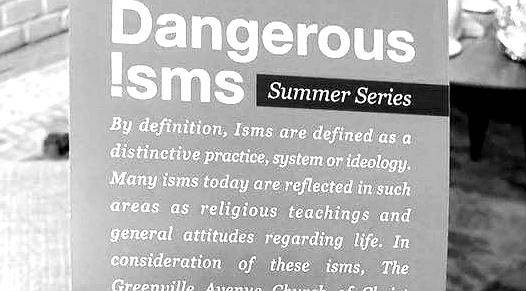
The Greenville Avenue Church of Christ near Dallas, Texas, will introduce in their summer sermons a series of so-called “Dangerous Isms.” Every week, pulpit minister Shelton Gibbs III will tackle some of those “Dangerous Isms”. For example, they will talk about Alcoholism, and Pessimism, and Materialism. Those are -isms that could be named dangerous for human mind or body. But they will also discuss Judaism and Islamism as dangerous “-isms” and people are very upset about that. Sometimes, religion could really be harmful, but it is certainly too provocative to put it side by side with alcohol abuse disorder.
For example, people condemned the fact that Judaism was put in the same basket with alcoholism or materialism:
“We’re not here to criticize or be antagonistic toward people and to beat them down,” Gibbs said. “There’s no threat. The people in the community should not feel a threat.”
Joel Schwitzer, regional director of the American Jewish Committee Dallas, said he thinks the church had no ill intent. “But it’s the effect that counts,” he said.
“To put another religion in the same class as alcoholism or materialism, pessimism — certainly, while the intent may not have been to be provocative or antagonistic as the minister stated … that was the impact,” Joel Schwitzer, regional director of the American Jewish Committee Dallas, said.
To compare alcoholism, which is really dangerous, to religions such as Judaism and Islamism is bound to provoke the reaction from those communities. It is different thing to say you disagree with other religions (or non-religion) than to call everyone else is a threat to you.
“Atheisim” [sp] is somehow on the list, too but those societies today that are the most religious — where faith in God is strong and religious participation is high — tend to have the highest violent crime rates, while those societies in which faith and church attendance are the weakest — the most secular societies — tend to have the lowest.
Pulpit minister Shelton Gibbs III told The Dallas Morning News that while the wording used in advertising could have been better, other faiths run counter to God’s order to follow Jesus Christ. Gibbs also said topics such as racism or sexism won’t be discussed because “there are only so many Wednesdays in a summer.” “We’re living in an age where every word means something, and you have to be very careful about the words that you use,” Gibbs said. “And I think going forward, I’m sure we’ll be able to phrase it where people are drawn in, and not that we have somehow marginalized them and caused them to fear.”
Church leadership was scheduled to meet Sunday night to discuss the social media backlash.
Photo Credits: Twitter
